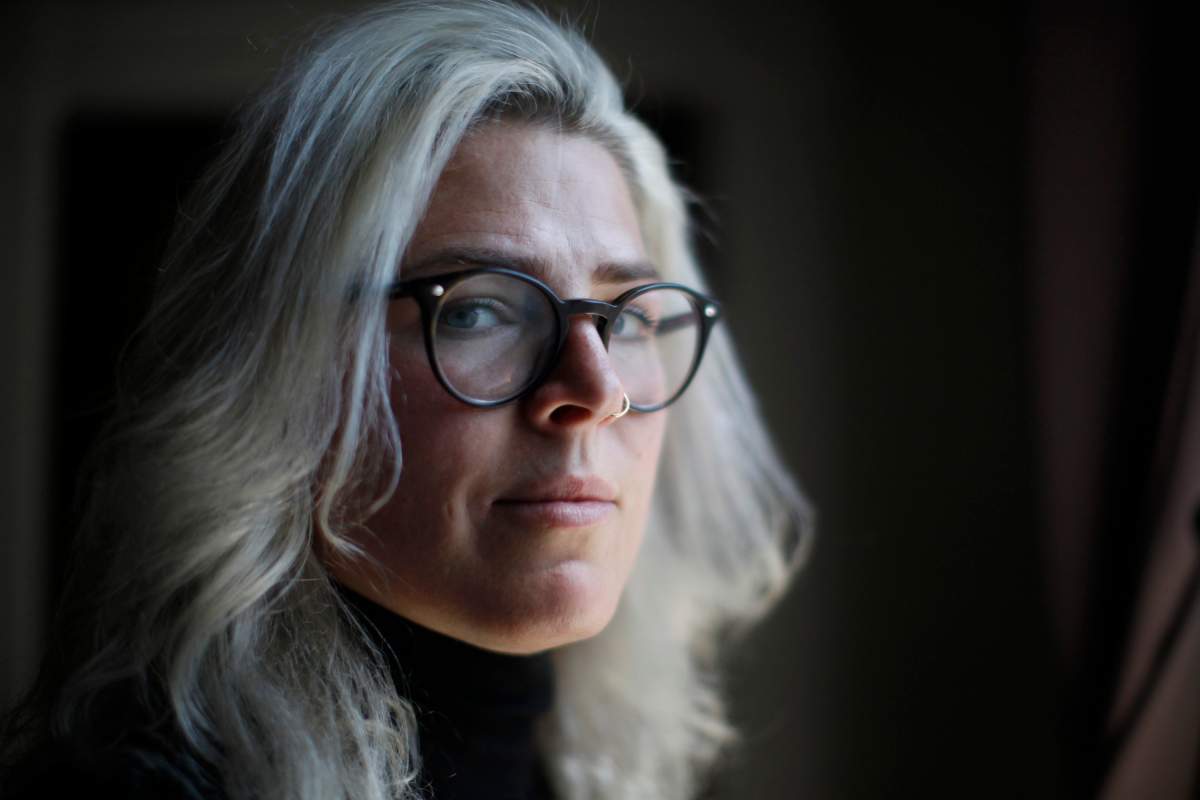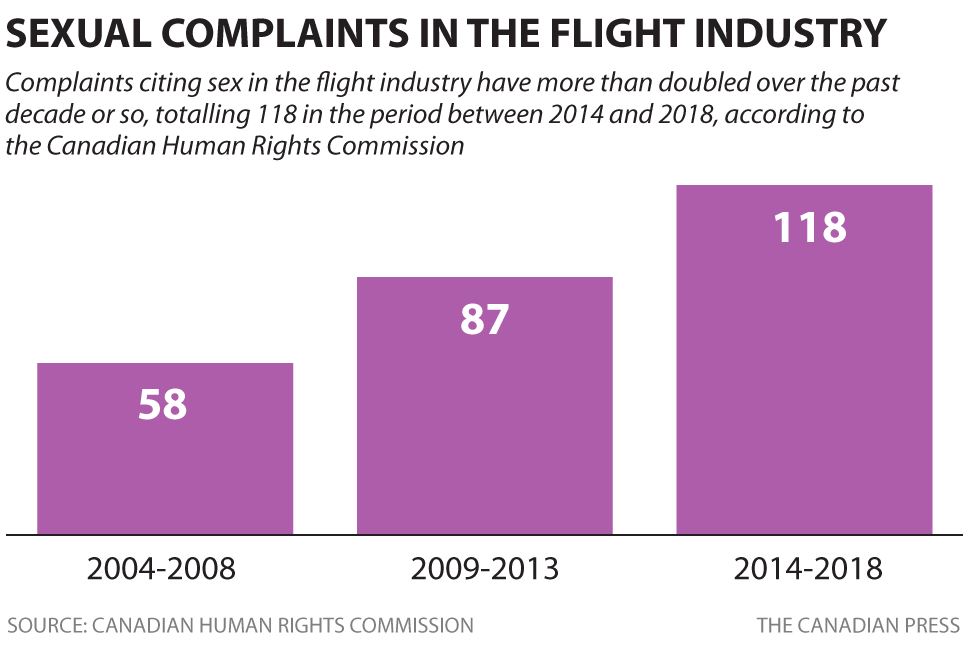Mandalena Lewis was enjoying a layover in Hawaii with her WestJet co-workers the night she says a pilot pinned her down and tried to force her to have sex.

“I escaped being raped, but I was sexually assaulted,” the former flight attendant said.
A warm Sunday evening on the sands of Maui’s Makena Beach Resort in January 2010 had led to a group dinner and then an invitation from the pilot to have drinks on his balcony, which she accepted. Once in the room, he “dragged her onto the bed, kissing her and groping her” as she “physically resisted the assault and yelled for him to stop,” according to Lewis’s 2016 lawsuit against WestJet, filed in B.C. Supreme Court.
“It was a terrible situation. It was traumatizing,” Lewis, 33, told The Canadian Press.
Lewis later learned that WestJet had investigated a complaint from a flight attendant two years earlier alleging the same pilot had sexually assaulted her during a layover in Alberta, according to the lawsuit. It states the company did not discipline or fire him, nor take steps to warn or protect women scheduled to work with him.
WATCH: (Mar. 2016) 2 WestJet workers taken off active duty in response to sexual assault allegations

WestJet has denied the allegations, which have not been proven in court.
Fired in 2016 after eight years with WestJet, Lewis has spoken out publicly about the “toxic” relations and “cowboy culture” at airlines and launched a proposed class action lawsuit against her former employer.
On Thursday, the Supreme Court of Canada refused to hear WestJet’s arguments to quash the lawsuit, which accuses the airline of failing to provide a harassment-free workplace for women. WestJet previously failed to scuttle the action in the B.C. courts after arguing that the dispute belongs in the quasi-judicial realm.
Airline insiders say the alleged incident speaks to an industry plagued by sexual harassment and gender discrimination as it struggles to shed a “frat boy culture” among pilots that plays out in everything from lewd jokes in the cockpit to “midnight knockers” at the hotel door.

Get breaking National news
The Canadian Press spoke with seven current and former flight attendants and multiple experts who say aviation is struggling to rise above 20th-century attitudes and adapt to the #MeToo era.
Complaints citing sex in the flight industry have more than doubled over the past decade or so, totalling 118 in the period between 2014 and 2018, according to the Canadian Human Rights Commission. Harassment-specific complaints that cite sex rose 58 per cent between 2004 and 2018.
By comparison, other federally regulated industries such as banking, broadcasting and telecommunications saw fewer than 10 complaints collectively over the past 15 years, according to the commission, despite having much bigger workforces.
Airline employees highlighted a lopsided dynamic in which men occupy the vast majority of pilot jobs – 93 per cent at Air Canada and WestJet, slightly more balanced than the industry average of 95 per cent – and women comprise between 70 and 80 per cent of the country’s 15,000 flight attendants, according to the Canadian Union of Public Employees.
“When there’s a hierarchy like that, it creates a power dynamic, and some people will take advantage of it,” said flight attendant Florence LePage, citing sexist humour as one of the softer manifestations.
On a flight between Yellowknife and Whitehorse this year, a pilot phoned her from the cockpit to ask, “‘What is the difference between a chickpea and a lentil?’ Then he said, ‘The difference is that I would not pay to have a lentil pee on my face,'” recalled LePage, who is in her 20s and works at a major Canadian airline.
Other flight attendants pointed to incidents of pornography on the flight deck and unwanted advances after touchdown.
“I was warned constantly about midnight knockers,” said one flight attendant who has worked at WestJet for more than 15 years and wished to remain anonymous for fears about job security.
WATCH: (April 2016) Female flight attendants suing WestJet

She alleges she was at a bar on a layover in Moncton soon after joining the company and the pilot, who had consumed several margaritas, started to stroke her.
“I just remember the feeling of the back of his hand on my upper arm…and of course it was unwelcome. So I said, ‘OK, I’ve got to go.’ And as I’m on my way out, the first officer does the same dang thing.”
The pilot insisted on walking her back to the hotel, which was across the street. In the elevator, she said he snapped the room key from her hand. She said she managed to retrieve it and waited for him to pass by before stepping into her room, which was adjacent to his. “I dead-bolted my door and I thought, ‘Thank God that’s over.'”
Then the phone rang. “He said, ‘Hi, it’s me.’ And I said, ‘What do you want?’ And he said, ‘I just wanted to make sure you made it to your room okay.'” She hung up.
“I was absolutely terrified.”
An undercurrent of in-flight flirtation can blend easily into romantic encounters during trips of up to four days spent with the same colleagues in far-flung climes. But the dynamic can also spill over into unsolicited, sexually aggressive behaviour from male colleagues and passengers, said Jocelyn Frye, a senior fellow at the Centre for American Progress who focuses on women’s rights and economic security.
“They’re away from family, they don’t have those constraints, nobody’s around…they can do sort of crazy things and they think there’s no consequence,” Frye said.
“That can create more vulnerability and more potential for harm for people on the receiving end of those comments or that conduct.”
Expectations can also become internalized, with employees labelling less party-inclined colleagues as “slam-clickers.”
“It means that if you go to your hotel room and you slam your door and you click it locked, you don’t hang out and you’re antisocial,” said Mandalena Lewis. “I’ve been called a slam-clicker.”
WestJet said in an email it treats harassment seriously and is “committed to providing and ensuring a safe and harassment-free environment for WestJetters and guests.”
The company highlighted an anonymous whistleblower hotline and safety reporting system, and said its “respect-in-the-workplace policies” are clearly outlined, in addition to mandatory annual training.
Air Canada, meanwhile, said it has “zero tolerance for harassment, discrimination or violence in the workplace.”
“Employee safety and well-being is one of our cornerstone values which we will not compromise,” the company said in an email.
The stalwart statements come as cold comfort to Lewis.
“‘Be a dutiful daughter. Don’t be a problem employee,'” she said, mimicking their stance.
“It’s a #MeToo dumpster fire…and it’s exhausting for survivors.”








Comments
Want to discuss? Please read our Commenting Policy first.